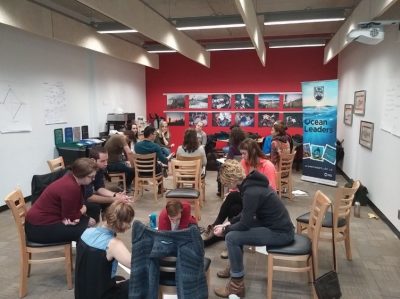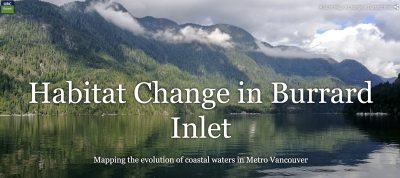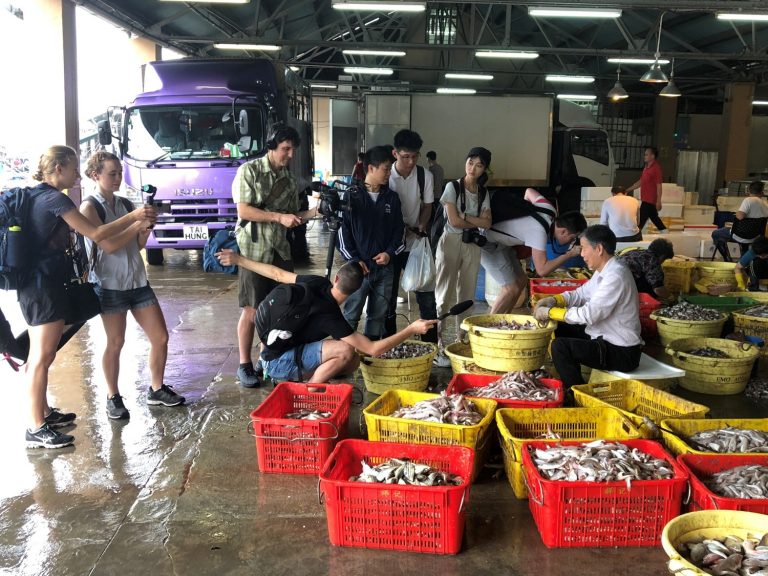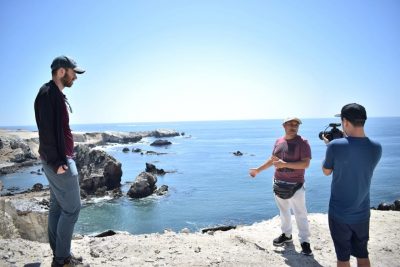 The Training Our Future Ocean Leaders (Ocean Leaders) program challenges graduate students and post-doctoral fellows to translate marine research and theory into action.
The Training Our Future Ocean Leaders (Ocean Leaders) program challenges graduate students and post-doctoral fellows to translate marine research and theory into action.
Now in its fourth year, Ocean Leaders teaches students from across disciplines in the natural and social sciences how to communicate marine research to a broad audience, how to craft and analyze ocean policy, and how to collaborate with people from diverse academic backgrounds and with diverse priorities when it comes to maintaining the health of Earth’s oceans.
Getting the chance to attend the program and become an ocean leader was one of the reasons that Roshni Mangar, a second-year master’s student studying at the Institute for the Oceans and Fisheries (IOF), chose to complete her degree at the University of British Columbia (UBC).
“One of my motivations in applying to grad school was to produce more actionable science and to convert that science into policy. The Ocean Leaders program provided a space for me to learn the necessary skills to make this happen,” Mangar said.
 To complete the program, students must contribute to a community project where they are tasked with locating and then implementing solutions to a real-world oceans problem. Mangar and her teammates (Meaghan Efford, Fanny Couture and Matias Oddo) worked with West Coast Environmental Law, a non-profit environmental law group, to create an ArcGIS story map for the Tsleil-Waututh First Nation. Viewers can scroll down the ArcGIS story map webpage and scan highlighted areas on the map to see how fish populations, vegetation, infrastructure, fishing methods, and human settlements have changed over time in the Burrard Inlet, the place that Tsleil-Waututh people have called home for millennia.
To complete the program, students must contribute to a community project where they are tasked with locating and then implementing solutions to a real-world oceans problem. Mangar and her teammates (Meaghan Efford, Fanny Couture and Matias Oddo) worked with West Coast Environmental Law, a non-profit environmental law group, to create an ArcGIS story map for the Tsleil-Waututh First Nation. Viewers can scroll down the ArcGIS story map webpage and scan highlighted areas on the map to see how fish populations, vegetation, infrastructure, fishing methods, and human settlements have changed over time in the Burrard Inlet, the place that Tsleil-Waututh people have called home for millennia.
“I’m an international student, so doing this project helped me connect to the Vancouver area. It gave me the chance to interact with the Tsleil-Waututh Nation, to understand their perspectives, and also learn more about Vancouver’s history as well as the history of local First Nations,” Mangar said.
For their community projects, this year’s students have just begun finding ways to solve the problem of ships dumping waste off the coast of B.C., examining what can be done to stop Styrofoam washing up on B.C.’s shores, and measuring the potential social and environmental costs of trapping carbon dioxide from the atmosphere and storing it in the ocean.
 Ocean leaders in training also get to journey outside the lab and use their science skills to explore creative, non-academic science communication. Caroline Graham, a recent graduate of the oceans and fisheries master’s program, travelled to China to collaborate with UBC journalism students and faculty and produce an award-winning story for NBC News about the costs of the fishmeal industry.
Ocean leaders in training also get to journey outside the lab and use their science skills to explore creative, non-academic science communication. Caroline Graham, a recent graduate of the oceans and fisheries master’s program, travelled to China to collaborate with UBC journalism students and faculty and produce an award-winning story for NBC News about the costs of the fishmeal industry.
“I got a first-hand look at the fishmeal industry in China, and an opportunity I never thought I’d have as a grad student to see inside the journalism world and participate as a scientist,” Graham said. “Getting to see the scale of things was exciting and terrifying.”
Past students have also told their (occasionally terrifying) research stories on stage to live audiences in a collaboration with the non-profit science storytelling group, Story Collider.
 Storytelling is a regular part of the program, as students and faculty gather once a month to entertain one another and share stories about their research and life journeys in story time sessions.
Storytelling is a regular part of the program, as students and faculty gather once a month to entertain one another and share stories about their research and life journeys in story time sessions.
“I enjoyed these sessions, because sometimes I view professors or researchers as perfect individuals, but everyone makes mistakes,” Mangar said. “The sessions gave me the chance to learn about the different paths the faculty or researchers have taken to get to where they are.”
Dr. Simon Donner, the Director of Ocean Leaders program and Professor in the Institute for the Oceans and Fisheries and the Department of Geography at UBC, said that he plans to embed the training offered by Ocean Leaders into the IOF’s master’s degree program so that all students completing their degrees will leave with foundational knowledge of how to communicate science and work with diverse stakeholders to craft good policy.
“Solving the problems of tomorrow isn’t about being a lone hero. It’s about bringing everybody along. How do you work with the community?” Donner said. “What do you do when all of the stakeholders don’t agree? How do you translate your scientific knowledge to people that might not always want to hear it? That’s what the program is about.”
“The people emerging from this program are marine experts that know how to bring different stakeholders together to solve the challenges of tomorrow,”Donner added. “They’re ready to both be academics and work with governments, NGOs and private industry to solve ocean problems, not just study them theoretically.”
Tag: Aboriginal fisheries, China, fieldwork, fishmeal, Indigenous fisheries, IOF students, Ocean Leaders, Research, science communications, Simon Donner, Tsleil-Waututh Nation